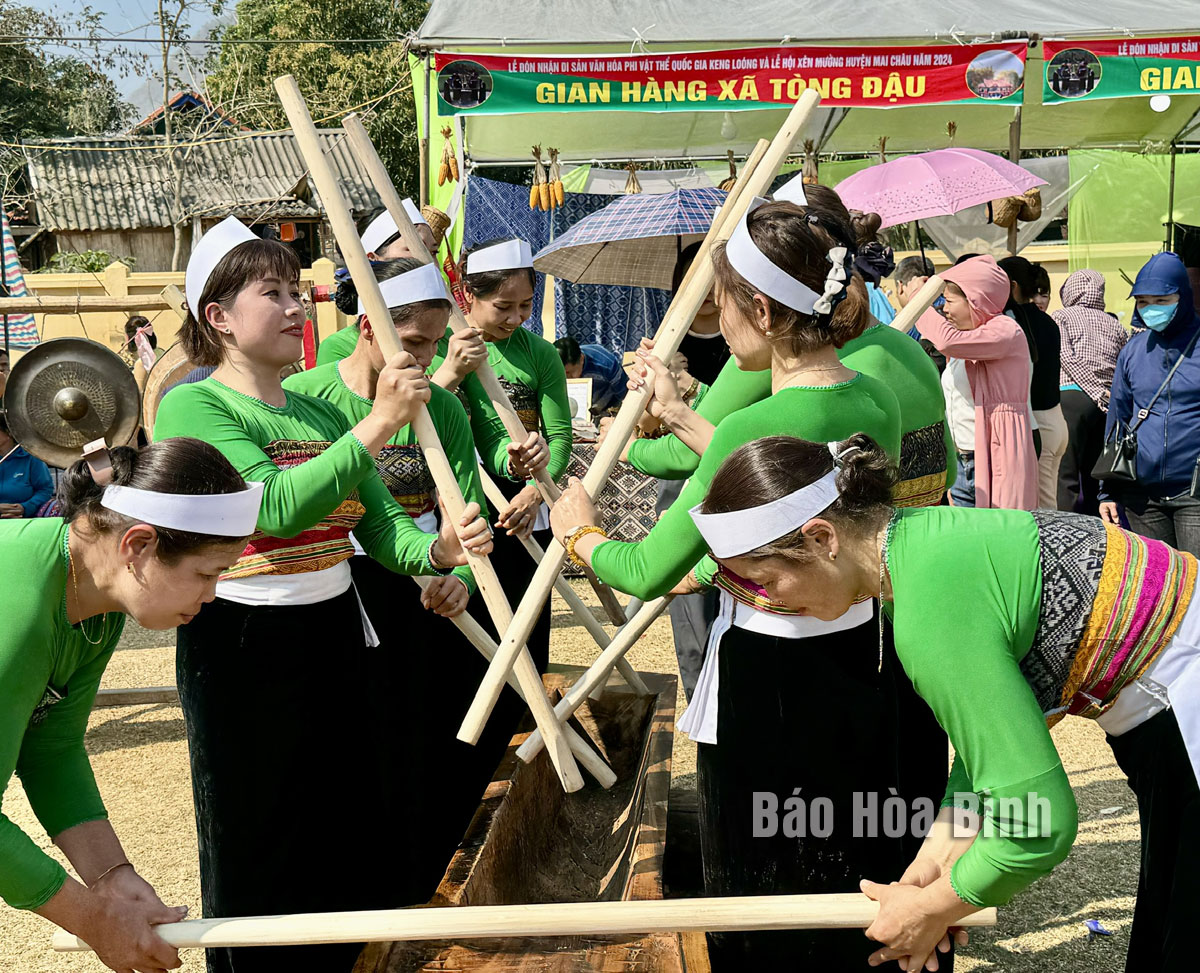
The Xen Muong festival was held on a district-wide scale this year. It was even more special because the event of receiving the certificate of National Intangible Cultural Heritage for the social practice and belief of Keng Loong took place within the festival space.

Residents of Tong Dau commune showcase
the Keng Loong ritual at Xen Muong festival.
The
Xen Muong festival is held annually in spring in Chieng Chau commune,
considered the first capital and the origin of the Thai people who migrated
from Lao Cai’s Bac Ha to Mai Chau in the 13th century. Through historical
upheavals, generations of Thai tribal leaders have played a significant role
alongside the population in cultivating and establishing villages and hamlets.
From
the early hours, the Bon village shrine in Chieng Chau commune saw a bustling
crowd of locals and tourists offering incense. Prior to this, ritual masters
conducted solemn ceremonies, inviting village elders and envoys to partake in
the festivities, receiving heartfelt offerings from the villagers. The ritual
praised the patriotic spirit, expressing profound reverence and gratitude to
the ancestors, seeking favourable weather and national prosperity, ensuring
abundance for all.
Vice
Chairman of the Mai Chau district People’s Committee Hoang Duc Minh said Xen
Muong festival is a cherished folk tradition and cultural practice deeply
ingrained in the local community. Through organising the festival, the aim is
to honour the cultural identity of the ethnic community, and promote and
introduce the history, cultural and tourism potential, contributing to developing
a healthy cultural and spiritual life, and fostering a joyful and vibrant
atmosphere at the onset of the Year.
In
addition to the captivating Keng loong performances, the festival atmosphere
was further enlivened by a variety of communal activities, including folk
costume contests and cultural exchanges, culinary competitions, and traditional
ethnic sports tournaments. The event attracted thousands of domestic and
international tourists. Nguyen Hai Quang, a tourist from Hanoi,
enthusiastically shared: "I look forward to returning to Mai Chau to
experience more of its traditional beauty and the wonderful cultural heritage
that the locals are diligently preserving and promoting".
With an increasingly vibrant and widespread emulation movement aimed at building cultured residential areas and cultured families, Yen Thuy District has been making steady progress toward improving both the material and spiritual well-being of its people, while fostering a civilized, prosperous, beautiful, and progressive community.
Once lacking recreational spaces and community facilities, Residential Group 2 in Quynh Lam Ward (Hoa Binh City) has recently received attention for the construction of a new, spacious, and fully equipped cultural house. The project followed the model of state support combined with public contributions in both labor and funding.
The "All people unite to build cultural life" movement, which has been effectively integrated with Kim Boi district’s socio-economic development goals, is fostering a lively spirit of emulation across local residential areas, hamlets, villages, public agencies, and enterprises. In addition, through the initiative, traditional cultural values are being preserved and promoted, while community solidarity and mutual support in poverty reduction and economic development are being strengthened.
A working delegation of the Hoa Binh provincial People’s Committee led by its Permanent Vice Chairman Nguyen Van Toan on June 11 inspected the progress of a project to build the Mo Muong Cultural Heritage Conservation Space linked to tourism services in Hop Phong commune, Cao Phong district.
Born and growing in the heroic land of Muong Dong, Dinh Thi Kieu Dung, a resident in Bo town of Kim Boi district, in her childhood was nurtured by the sweet lullabies of her grandmother and mother. These melodies deeply imprinted on her soul, becoming an inseparable part of her love for her ethnic group's culture. For over 20 years, this love for her hometown has driven Dung to research, collect, and pass down the cultural values of the Muong people to future generations.
In the final days of May, the Ethnic Art Troupe of Hoa Binh Province organized performances to serve the people in remote, mountainous, and particularly disadvantaged areas within the province. These were not just ordinary artistic shows, but they were the meaningful journeys aimed at spreading cultural values, enhancing the spiritual life of the people and contributing to the preservation of ethnic minority cultural identities.



